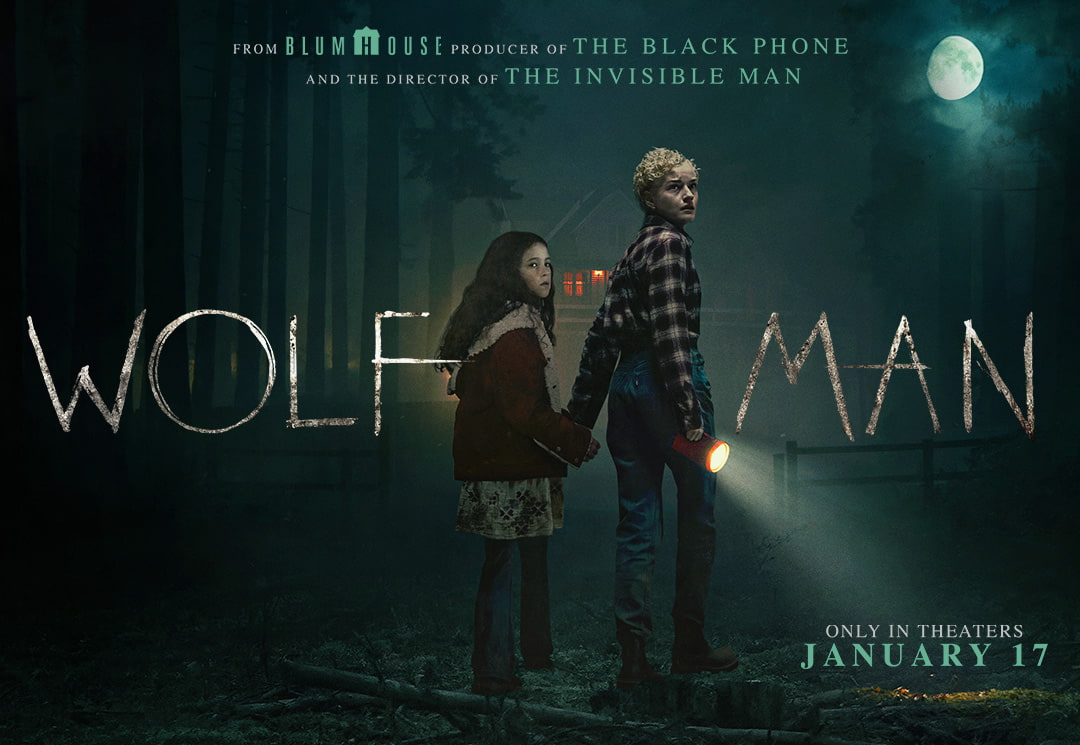When a monster movie premieres, it often comes with significant baggage and is rarely regarded as a cinematic masterpiece. When the creature in question is one of the iconic Universal monsters, the director might as well hire an entire moving crew to manage the tropes, expectations, and preconceived notions attached to the genre. Leigh Whannell’s latest entry, Wolf Man, sheds decades of rehashed storytelling to deliver a more streamlined—and, in my view, more faithful—tribute to the golden age of movie monsters.
Whannell has already proven his skill in reviving classic creatures from Universal’s golden era of the 1930s and 1940s. His 2020 reboot of The Invisible Man was widely praised as smart, well-acted, and fresh, achieving significant commercial success despite a pandemic release. However, I’m not convinced this remake of 1941’s The Wolf Man will see the same level of success.
I left the theater feeling like I’d just watched a decent popcorn flick. At a lean 103 minutes, it delivers plenty of drama, suspense, and intriguing insights into how becoming the Wolf Man alters a person’s perception and mind. However, the narrative is thinner and less developed compared to The Invisible Man. This is unsurprising given that Wolf Man is nearly an hour shorter. For me, that’s the tradeoff—I enjoyed the tighter pacing but missed the depth a longer runtime might have offered. Don’t get me wrong, I have nothing against long movies, but I’d rather watch a concise, enjoyable film than sit through a bloated one that overstays its welcome.
The premise is straightforward: San Francisco writer, husband, and father Blake (Christopher Abbott) travels to the Oregon wilderness with his wife Charlotte (Julia Garner) and daughter Ginger (Matilda Firth) to pack up his family home after his estranged father’s death. The family is soon attacked by a creature, and Blake is clawed on the arm but manages to get his family to relative safety. What follows is a relentless onslaught from the creature and Blake’s descent into transformation.
Whannell eschews much of the formulaic buildup typical of horror movies. In another film, we might wade through endless packing scenes, family drama, and heavy-handed foreshadowing. Instead, Whannell skips these conventions, leaving out many of the tropes that often feel obligatory in werewolf films. There are no silver weapons, no gypsies, and no drawn-out monologues about full moons or wolfsbane. The film makes only passing references to a missing hiker and Indigenous folklore. I appreciated this restraint.
Had Whannell gone the other direction, we might have ended up with another misfire like Joe Johnston’s 2010 The Wolfman. That film is a prime example of trying to cram too much into a mediocre effort—bloated Gothic drama, clichés, and overdone CGI at every turn. A werewolf movie doesn’t need all that. It needs myth, a hunt, and, most importantly, transformation. Whannell nails these essentials, especially the last.
The physical transformation is gruesome, with prosthetics and practical effects evoking the visceral body horror of The Fly or An American Werewolf in London. Watching Blake’s bones snap and contort is both terrifying and mesmerizing—a clear homage to 1980s horror craftsmanship. The transformation spans much of the film, with Blake’s shifting perspective offering a haunting glimpse into his altered reality.
Though the narrative is sparse, what’s there is effective. Charlotte and Ginger provide an emotional anchor for Blake’s character arc. Firth shines as the daddy’s girl watching her father’s humanity slip away. Garner’s performance as Charlotte is competent, though slightly wooden. My real issue lies with the film’s hair and makeup choices, which undermine her character as a professional journalist and mother. Her oddly styled pixie cut and wardrobe skew more “big sister” than “working mom,” making it hard to take her seriously at first. That impression faded as the film progressed, but it was a distraction nonetheless.
Wolf Man isn’t a reinvention of the monster movie, but that’s not a bad thing. It taps into primal fears and delivers a satisfying experience for casual viewers. Die-hard fans may find Whannell’s omissions jarring, but overall, it’s worth a watch. I’d give it a solid 7 out of 10.


